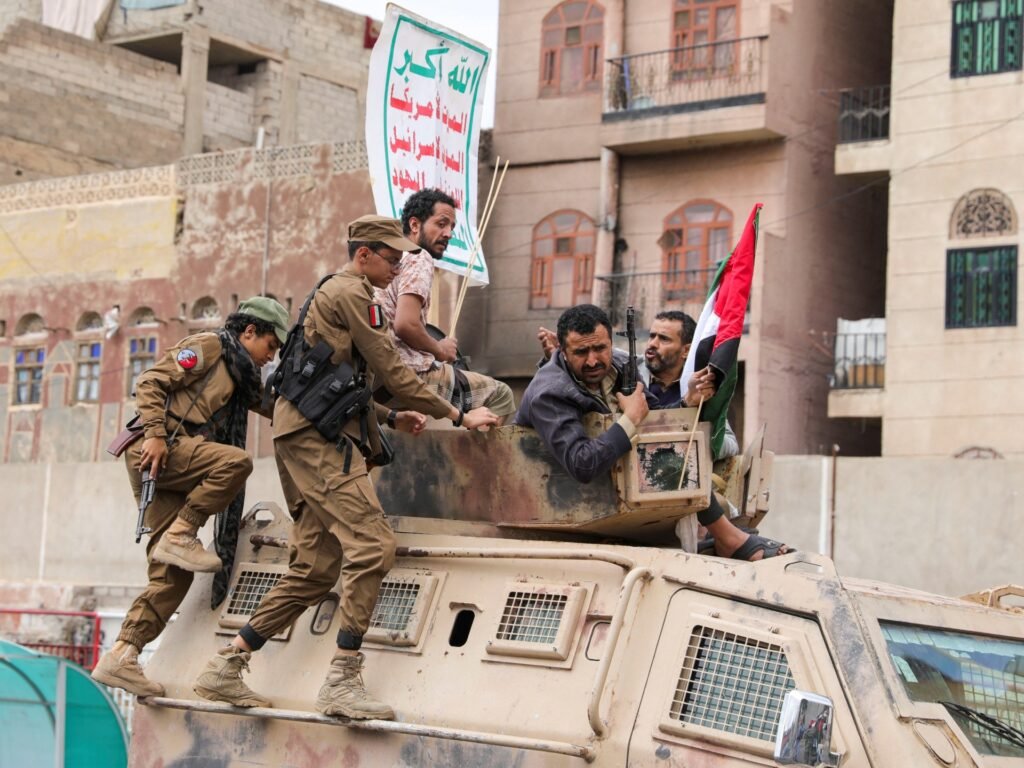Sanaa, Yemen – Mansour Saleh, a 25-year-old history graduate in Sanaa, is captivated by political and military developments in Syria.
“Stunning,” “mysterious” and “unexpected” were some of the words he used to describe what was happening in the country this month.
The Overthrow of Syrian leader Bashar al-Assad In early December, millions of Yemenis pondered what lies ahead for their own country.
Some say the fall of Yemen’s Iran-allied Houthis – who control Sanaa and much of northern and western Yemen – could be the region’s “next surprise.”
“My friends have different views. Some called me and were happy about the fall of the Syrian regime, others were sad about such a scenario. We are a strongly divided society,” Saleh said.
Crying over the fall of Damascus
For Houthis, who see themselves as part of a broader Iran-led “Axis of Resistance” against Israel and the United States, al-Assad’s defeat feels personal.
Under al-Assad, Syria was considered an important part of the axis and a route for arms transfer between Iran, Iraq and Lebanon.
Abdulrahman Ali, a 40-year-old from Sanaa, says the fall of the former Syrian regime is a “massive loss.”
“When I saw the news about the fall of Damascus to Turkish-backed Syrian militant groups, I cried. Personally, I don’t care about Bashar. What matters is the continued strength of the resistance axis,” Ali told Al Jazeera.
The Houthis, the carried out an armed takeover of Sanaa They are part of Iran’s “Axis of Resistance,” which includes the Islamic Resistance of Iraq, the Popular Mobilization Forces of Iraq and the Lebanese Hezbollah. The former Syrian government was also considered part of the Axis.
The Houthi takeover sparked a war as the ousted government and regional allies – led by Saudi Arabia and the United Arab Emirates – sought to regain control of Yemen.
In April 2022, a UN-sponsored ceasefire ended the fighting, but control remains divided between various groups, including the Houthis, as well as the Yemeni government and the Southern Transitional Council in the south and east.
Today, pro-Houthi Yemenis like Ali say the war in Yemen could well start again.
“The current scenario in Syria could tempt anti-Ansar Allah groups to start a war,” he said, using the Houthis’ official name. “This will plunge us into a new vicious circle of violence.”
The Houthi leadership is not afraid of a resumption of fighting, Mohammed Ali al-Houthi, a senior member of the Houthi Supreme Political Council in Sanaa, said in a television interview on December 12.
He added that the Houthis were ready should “aggression” against Yemen resume, using a term the Houthis use for attacks by forces opposed to them.
“The Yemeni people do not care about threats,” al-Houthi added. “Any stupidity of the Israeli enemy against Yemen will trigger the (military) operations of the Yemeni armed forces.”
“End of the Iranian presence”
On the other side of the Yemeni divide are millions of opponents of the Houthis who see the fall of al-Assad as a victory for freedom and a defeat for tyranny.
“Finally the Syrian people have justice,” said Faisal Mohammed, a 39-year-old teacher in Taiz, a city largely controlled by anti-Houthi forces that has suffered for years under siege by the rebel group. “Assad’s fall gives us hope that the Arab world can rise above oppression.”
Faisal Mohammed sees the events in Syria as a message to the Houthis.
“Assad’s dynastic rule has collapsed after 54 years… no matter how long the Houthis continue, they will suffer the same fate.”
With Iranian support over the last decade including weapons According to experts, Yemen’s Houthis have fought numerous battles against pro-government forces and increased their influence across large parts of Yemen.
The group appears militarily and politically secure, and Saudi Arabia has been looking for a way out of its involvement in Yemen for years and at times appears to be on the verge of reaching an agreement with the Houthis. The anti-Houthi camp, on the other hand, often appeared weak and divided, and many anti-Houthi Yemenis were disappointed by the failures of their representatives.
In fact, it appeared that the Yemeni government would have to do this agree to an agreement with the Houthis or by Saudi Arabia.
However, events in the wider region, including the general weakness of Iran and its allies as a result of their conflict with Israel, have given many in the anti-Houthi camp hope that things have changed.
“Hezbollah has suffered huge losses by Israel, and Assad’s regime will be eliminated. “Iran could do nothing,” said Faisal Mohammed. “Therefore, the Houthis are likely to suffer a similar fate, and that means uprooting the Iranian presence in Yemen.”
Mohammed Abdu, a Taiz-based Yemeni journalist specializing in politics and war, told Al Jazeera that the fight to oust the Houthis was “a challenge.”
“The military strength and capabilities of the Houthis are enormous. They have thousands of fighters and arsenals of weapons,” he said.
“However, a joint effort by the Yemeni government and its regional and international allies can accelerate the Houthi collapse.”
A cautionary tale
But for some Yemenis, al-Assad’s fall is more of a warning than anything else.
“Syria shows us that the overthrow of a dictator is not the end of history,” said Yunis Saleh, a shopkeeper in Sanaa. “What matters is what comes next. If Syria does not find peace, we will face the same endless cycle of violence.”
War-weary Yemenis share this sentiment, regardless of their political affiliation. For them, al-Assad’s fall is a reminder of the need for a comprehensive solution to Yemen’s decades-long crisis.
The war between the Saudi-backed Yemeni government and the Iran-aligned Houthis has caused a humanitarian catastrophe.
The World Health Organization (WHO) said In March this year, we announced that the conflict in Yemen was entering its tenth year and more than half of the country’s population is in urgent need of assistance.
An estimated 17.8 million people need medical attention, 50 percent of whom are children; 4.5 million people are displaced; and more than 3,700 schools were damaged or misused, the UN said.
“By peace or by force”
Abdulsalam Mohammed, the head of Yemen’s Abaad Studies and Research Center, told Al Jazeera that the Houthis’ actions in the waterways around Yemen, where the group attacked ships, were ostensibly in solidarity with Palestinians in the Gaza Strip under attack by Israel , international violations led to isolation and a campaign of airstrikes led by the United States and the United Kingdom.
The Houthis also carried out rocket and drone attacks on Israel, leading to Israeli attacks on Yemen.
The Houthis were removed from the US terror list in 2021 added again last January.
“There is a national, regional and international decision to end the rule of the Houthis in Yemen, whether through peace or by force,” Abdulsalam Mohammed said. “Time will tell how this comes about.”
Abdulsalam Mohammed also believes that this shift away from the Houthis extends to the Gulf.
“The Houthi drones and missiles have constantly threatened the oil-producing Gulf states,” Abdulsalam Mohammed said. “Therefore, if the opportunity to weaken the Houthis arises, the Gulf will capitalize on it. Similarly, Houthi opponents in Yemen will prioritize a military solution once the group’s overthrow becomes possible.”
The defeat of the “Axis of Resistance” in Syria and its losses in Lebanon could also pave the way for the overthrow of the Houthis in Yemen, according to Abdulsalam Mohammed.
“The Houthis have been looking for new allies like Russia,” he said. “However, this does not prevent the scenario of a collapse of Hezbollah or the overthrow of Assad’s rule from repeating itself in Yemen.”
“This is a unique opportunity for the Yemeni government to regain control of the provinces it lost to the Houthis in the final years of the war.”
But that may be easier said than done. There are few signs that anti-Houthi forces are preparing for a major offensive.
The Houthis control some of the most populous parts of Yemen, but the area is also largely mountainous and easier to defend than the flatter terrain on which the former Syrian opposition advanced before its fall on Damascus. The Houthis continue to receive support from many influential tribes in Yemen, particularly those surrounding Sanaa, which are crucial to any chance of regaining control of the capital.
Saleh, the history graduate in Sanaa, described the atmosphere in Yemen as calm for now, but added that it could “explode at any moment.”
“The Houthis are waiting for a fight to the death, and their opponents remain reluctant to start a war,” Saleh said. “It can begin at any time, but its end will be indefinite.”





